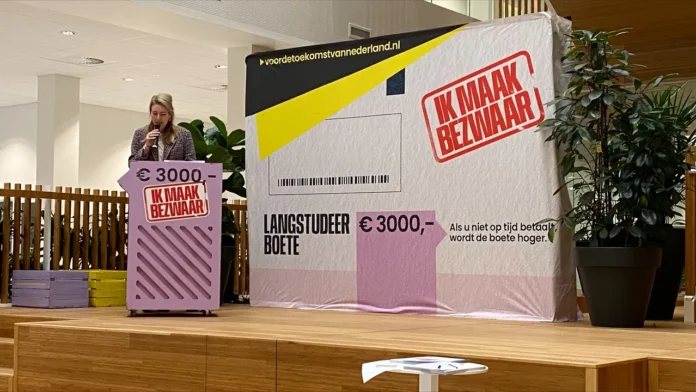The government wants to cut back on higher education by around 1 billion euros. This should be done by means of a fine for long-term students and a reduction in international students. In protest against these measures, more than 29,000 objections were submitted and read out at colleges throughout the country. This action ended on Wednesday morning at Fontys in Eindhoven.
On Tuesday afternoon, the thousands of objections were submitted to the House of Representatives. “This last session is our symbolic contribution to this protest,” says Joep Houterman, chairman of the Executive Board of the educational institution. “At the moment, the budget is being discussed in The Hague. In this way, we want to offer moral support to the voices that oppose the plans.”
Earlier, Houterman was with several teachers and students on the Malieveld in The Hague. Thousands of people protested against the plans of the House of Representatives. Education has to be cut in several ways, but what is most dismaying are the plans for a fine for long-term students.
Double punishment
“Something happens in someone’s life that makes them take longer to complete a study. Such as the death of a parent or a task as a caregiver,” says Lisette Weijers, director of Fontys Pedagogiek at whose location the reading session will take place. “If something like that happens to you and you also get a fine, then you are actually punished twice.” She is already feeling the consequences of the possibility of this measure. It would mean that students who take more than one extra year to complete a study would pay 3000 euros extra tuition fees for each additional year.
“I already notice that people are hesitant about starting a study because they don’t know whether they will succeed. That is a question that no one can ever answer in advance. The idea that they can now be fined if they cannot handle a course hinders people in their development.”
Potential
That is also what Houterman fears. “We think that people will graduate at a lower level than they could actually handle.”
Joris Boele is a student at Fontys who speaks on behalf of the participation council. “We are really trying to make it clear to the government that we are against this and that they should listen to current and future students,” he says. “The government should contribute to a country where everyone can study, develop themselves and find a place in society.”
International students
In addition to a fine for long-term students, the government also wants measures to reduce the number of international students. “We understand that the number of international students needs to be controlled, and we have measures for that,” says Houterman. “But we do think that this will have such a strong effect that it will ultimately result in fewer international talent who can and want to work in the Netherlands. But we really need that talent,” he thinks. “Especially here in the region, we have a very international economy.”
Boele: “As a knowledge country, we need students who can complete a good education and thus make a positive contribution to society.” But not only the economy is important. “I think it is a bad thing if people cannot find their place. People should be able to follow their passion and study what they want to study.”
Debate
In addition to the billion that is being cut at colleges and universities, there are also cuts in other areas of education such as vocational education and research. In total, it concerns two billion euros. The budget is still being discussed in the House of Representatives, after which the plan must still be passed by the Senate.
Source: Studio040
For Eindhoven News: Lila Mehrez
















